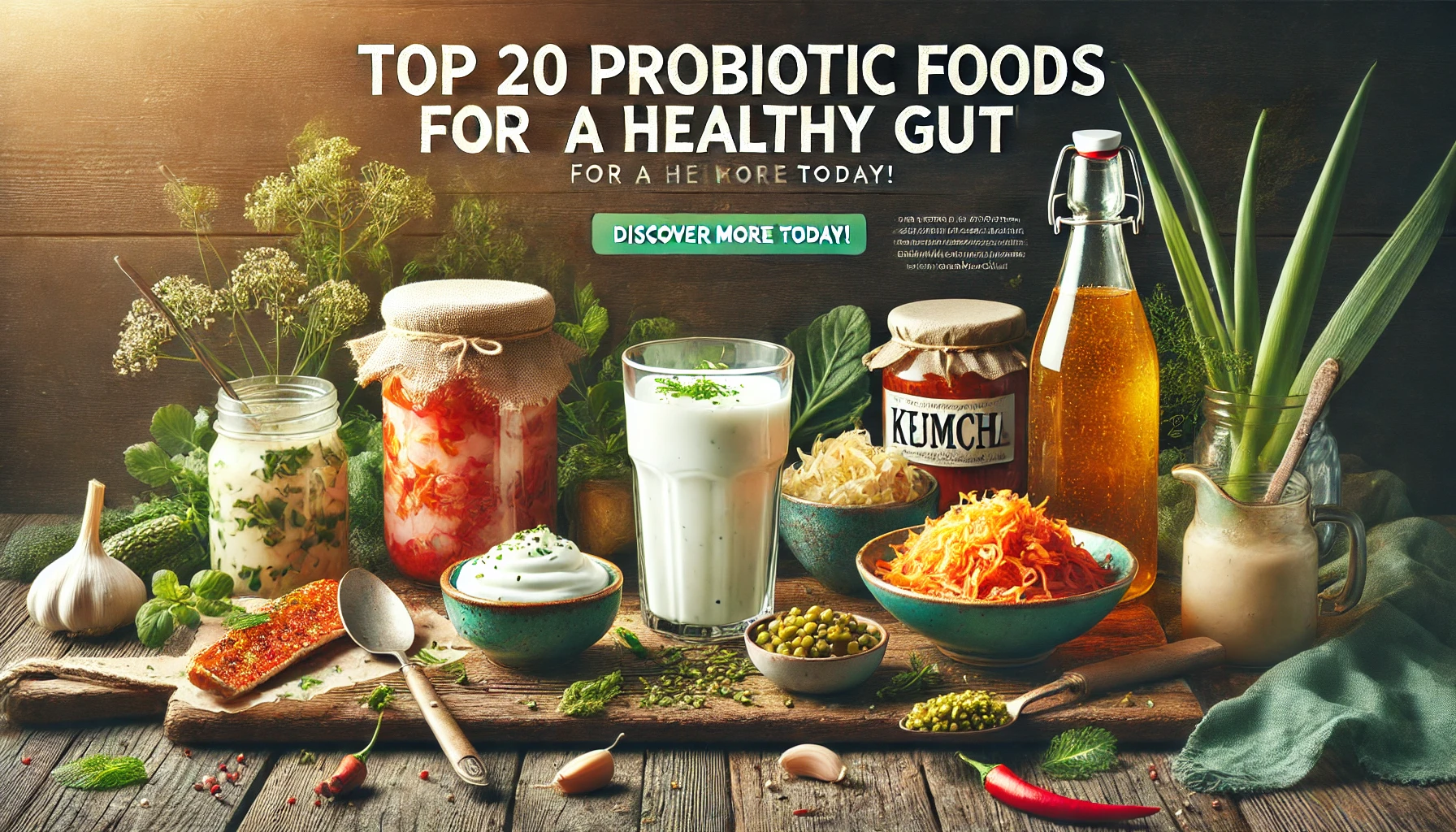Gut health is the cornerstone of overall well-being, and probiotics play a crucial role in maintaining a balanced digestive system. Probiotic foods, which are rich in beneficial bacteria, can improve digestion, enhance immunity, and even support mental health. Adding probiotic-rich foods to your diet is a simple and natural way to nurture your gut microbiome and promote long-term health.
In this article, we’ll explore the top 20 probiotic foods you can include in your meals to enjoy these incredible benefits. From traditional staples like yogurt to unique options like natto, there’s something for every palate.
What Are Probiotic Foods?
Probiotics are live microorganisms, often referred to as “good bacteria,” that reside in your guProbiotic foods are those that contain live microorganisms, often referred to as “good bacteria,” that help maintain the balance of your gut microbiome. These bacteria support digestive health, strengthen the immune system, and can even positively impact your mood and mental health.
A well-balanced gut is essential for nutrient absorption, hormone regulation, and reducing inflammation in the body. By adding probiotic foods to your diet, you can naturally encourage the growth of beneficial bacteria while keeping harmful microbes in check.
Top 20 Probiotic Foods You Should Include in Your Diet
1. Yogurt-The Most Popular Probiotic Food
Yogurt tops the list for good reason. Made by fermenting milk with live bacterial cultures like Lactobacillus and Bifidobacterium, it’s an easy and delicious way to boost your probiotics. Opt for plain, unsweetened yogurt to avoid added sugars.
2. Kefir – A Potent Fermented Milk Drink
Kefir is a fermented milk drink loaded with probiotics and essential nutrients like calcium and protein. It contains multiple strains of beneficial bacteria and yeast, making it more potent than yogurt.
3. Kimchi – A Spicy, Gut-Friendly Korean Dish
This spicy Korean side dish, made from fermented cabbage and radishes, is packed with live bacteria and antioxidants. It’s a flavorful way to improve digestion and add a kick to your meals.
4. Sauerkraut – A Classic Probiotic-Rich Cabbage Dish
Sauerkraut, or fermented cabbage, is a classic probiotic food with a tangy taste. Rich in fiber and vitamins, it promotes healthy digestion and supports the immune system.
5. Kombucha – A Refreshing Fermented Tea

Kombucha is a fizzy tea fermented with a SCOBY (symbiotic culture of bacteria and yeast). It is not only refreshing but also a powerful probiotic drink. It’s a popular choice for improving gut health and detoxification.
6. Miso – A Japanese Superfood for Gut Health
This Japanese staple, made from fermented soybeans, barley, or rice, is an excellent source of probiotics. Miso is often used in soups or as a marinade, providing both flavor and gut-friendly benefits.
7. Tempeh – A Protein-Packed Probiotic Alternative
Tempeh is a fermented soybean product with a firm texture and nutty flavor. High in probiotics, protein, and essential nutrients, it’s a great option for vegetarians and vegans.
8. Fermented Pickles – A Crunchy Probiotic Snack
Naturally fermented pickles, made without vinegar, are an underrated source of probiotics. They provide the tangy crunch you crave while supporting your digestive system.
9. Natto – A Japanese Fermented Soybean Dish

Natto, a traditional Japanese dish made from fermented soybeans, contains Bacillus subtilis, a unique probiotic strain. It has a strong flavor and sticky texture, but its gut-health benefits make it worth trying.
10. Traditional Buttermilk – A Mild Probiotic Drink
Traditional buttermilk, not to be confused with processed versions, is a probiotic-rich drink popular in many cultures. It’s mild in flavor and great for improving digestion.
11. Cottage Cheese – A Dairy Option with Probiotics
Cottage cheese, when made with live and active cultures, is a tasty way to include probiotics in your diet. Look for labels that specify “live cultures.”
12. Aged Cheeses – Delicious Probiotic Options
Certain aged cheeses, such as Gouda, cheddar, and Swiss, retain live bacteria during the fermentation process. These cheeses are a delicious and gut-friendly treat.
13. Sourdough Bread – A Probiotic-Friendly Grain Option
Sourdough bread, made using natural fermentation, contains beneficial probiotics and is easier to digest than regular bread.
14. Apple Cider Vinegar – A Natural Gut Booster
Raw, unfiltered apple cider vinegar with “the mother” is a good source of probiotics. Adding a tablespoon to water can aid digestion and support gut health.
15. Kvass

Kvass, a traditional Eastern European drink made from fermented rye bread or beets, is rich in probiotics and a refreshing addition to your diet.
16. Lassi
Lassi, a traditional Indian yogurt-based drink, is not only refreshing but also loaded with probiotics that support gut health. Enjoy it plain or spiced for variety.
17. Coconut Yogurt
For those who are vegan or lactose-intolerant, coconut yogurt is an excellent alternative. Made by fermenting coconut milk, it offers probiotic benefits without dairy.
18. Fermented Vegetables
Fermented carrots, beets, and cucumbers are lesser-known probiotic foods that pack a nutritional punch. They make great snacks or side dishes.
19. Idli and Dosa Batter
These South Indian staples, made from fermented rice and lentils, are naturally rich in probiotics. They’re a great way to support digestion while enjoying a delicious meal.
20. Dark Chocolate with Probiotics
Certain varieties of dark chocolate are infused with probiotics. This makes them a guilt-free way to satisfy your sweet tooth. They also boost your gut health.
How to Incorporate Foods into Your Diet
Adding probiotic foods to your diet can be simple and enjoyable. Here’s how:
- Have yogurt or kefir for breakfast.
- Snack on fermented vegetables like sauerkraut or pickles.
- Add a spoonful of miso paste to soups.
- Replace regular bread with sourdough bread.
- Sip on kombucha or lassi as a refreshing midday drink.
By incorporating these foods into your meals, you’ll improve your digestion and overall health effortlessly.
Benefits of Probiotic Foods
Including probiotic foods in your diet can provide a wide range of benefits:
- Improved Digestion: Probiotics aid in breaking down food and absorbing nutrients.
- Stronger Immunity: A healthy gut microbiome boosts the body’s defense system.
- Better Mental Health: Probiotics can alleviate symptoms of stress and anxiety due to the gut-brain connection.
- Balanced Weight: They help regulate metabolism and prevent weight gain.
FAQs About Probiotic Foods
While supplements can be effective, probiotic foods provide additional nutrients and are easier for the body to absorb.
Most people can benefit from probiotic foods, but individuals with certain medical conditions should consult a doctor before adding them to their diet.
Incorporating at least one probiotic food daily can help maintain a healthy gut.
No, only foods fermented with live bacteria that survive the process (e.g., yogurt, kimchi) contain probiotics.
Conclusion
Adding probiotic foods to your daily diet is a natural and delicious way to improve gut health and overall well-being. With options ranging from yogurt and kefir to kimchi and sourdough bread, there’s something for everyone to enjoy. Start small, experiment with different foods, and discover how probiotics can transform your health from the inside out



